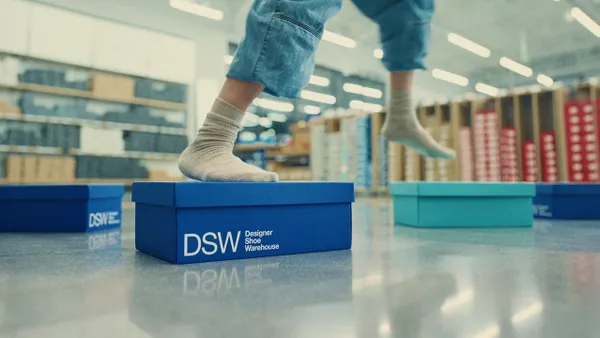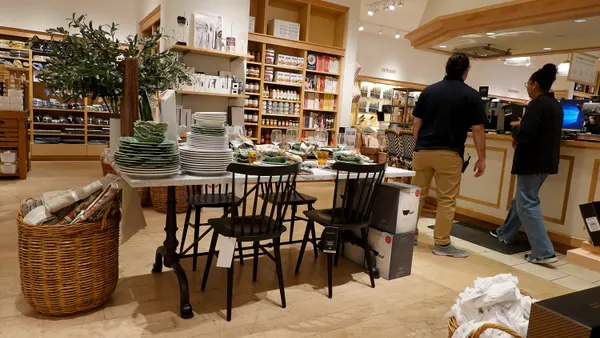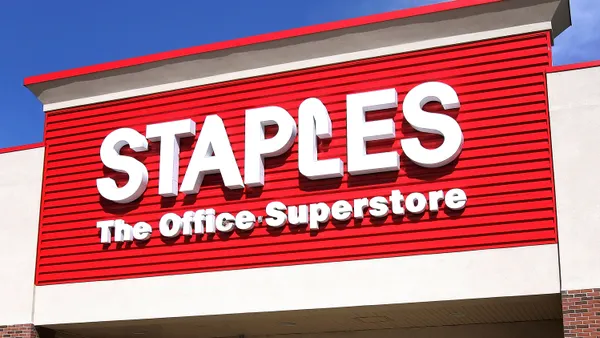Dive Brief:
-
Chinese e-commerce giant Alibaba on Thursday reported a booming second quarter that showed revenue rising 61% over last year, up to about $8.3 billion (55.1 billion yuan). Some of that growth is thanks to its cloud computing business, which rose 99%, but core commerce (coming from the Tmall and Taobao e-commerce websites) also increased a whopping 63% year over year to roughly $7 billion (46.5 billion yuan), according to a press release.
-
The company’s earnings beat estimates from S&P Global Market Intelligence, The Wall Street Journal reports, rising to about $2.7 billion (17.7 billion yuan). Alibaba increased its revenue guidance for fiscal 2018 up to 49% to 53%, from its previous range of 45% to 49%.
-
In the same week that Amazon kicked off Black Friday sales (a shocking 50 days early) Alibaba in Shanghai this week officially launched its 11.11 Global Shopping Festival, known as Singles Day, beginning with the launch of a "see now, buy now" fashion show that will be broadcast on seven TV networks and online channels, as well as online augmented reality games. The lineup of events will lead up to a celebrity-driven "countdown gala" beginning on Nov. 10, according to a separate press release.
Dive Insight:
American retailers may have something to learn from a shopping holiday on the other side of the globe, a day that last year raked in $18 billion (an increase of 32% over 2015) and should raise retailers' eyebrows.
More than 140,000 brands will participate in this year’s Singles Day event, offering promotions for more than 15 million product listings. Of that, some 60,000 international brands will be tapping into the half a billion Chinese shoppers visiting Alibaba’s platforms.
"The fact that more than two-fifths of this year’s 140,000 brands at the shopping extravaganza come from outside of China speaks to the continued international hope and bet that Chinese consumers will pick up the slack left by many brands’ own slowing domestic growth,” Andria Cheng, analyst and editor at large at eMarketer said in a statement emailed to Retail Dive.
Cheng anticipates that Alibaba "no doubt" will break new sales records this year. "The global marketing hype also will likely translate to record cross-border ecommerce demand,"” said in a statement emailed to Retail Dive. "For new international brands eyeing the China market, this event will continue to mark Alibaba’s biggest pitch and showcase for them to get on board its platform and test the waters regarding Chinese consumer demand and promise."
Singles Day has the potential to be a massive boon for American retailers struggling amid a rocky national climate that are looking for growth abroad. Chinese shoppers will generate almost half of all worldwide e-commerce sales in 2017, according to eMarketer. That’s about $1.1 trillion.
Retail e-commerce sales in China are poised to increase by 33%, reaching $1.13 trillion — about 23% of total retail sales in the country, according to data emailed to Retail Dive from eMarketer. (In the U.S., e-commerce sales in the second quarter made up just 8.9% of total retail sales).
Neither e-commerce in the country nor Alibaba itself are expected to see a slowdown any time soon. Growth will continue to rise with e-commerce accounting for 40.8% of all retail sales in China by 2021. M-commerce is also a boon: mobile will increase by almost 42% in China this year to hit $881.96 billion. Buying on that channel accounted for roughly 73% of retail e-commerce sales.
Much like how Black Friday has expanded from morning doorbusters the day after Thanksgiving, Singles Day has erupted from the constraints of a 24-hour holiday into a "bonanza" that now stretches 24 days. While shoppers have only been able to buy this week, the Chinese-ecommerce giant teed up the holiday three weeks ahead of the 24-hour event culminating on Nov. 11.
And this year, the event is focused on what Alibaba is calling its "New Retail" experience, a pillar of growth moving forward which includes interactive marketing promotions, shopping tours and virtual fitting rooms. The e-commerce giant, in many ways like Amazon, is quickly investing in futuristic technologies and massive, elaborate logistics networks that it believes will define the new era of retailing. And shopping holidays (yes days and even weeks) are just one piece of that.
This story is part of our ongoing coverage of the 2017 holiday shopping season. You can browse our holiday page and sign up for our holiday newsletter for more stories.













